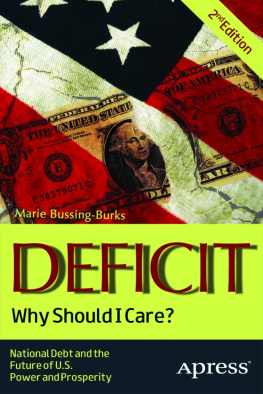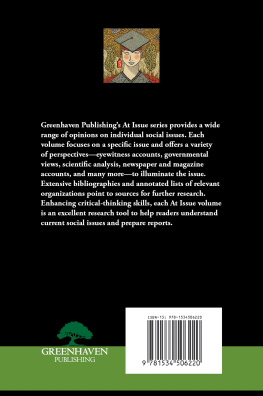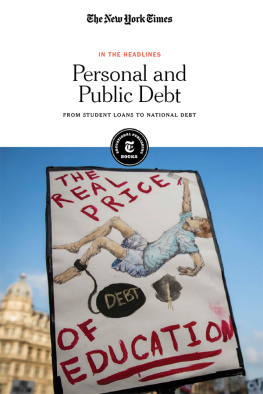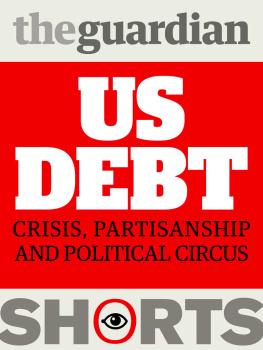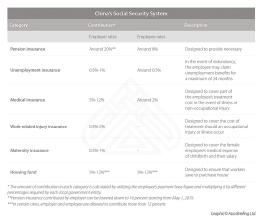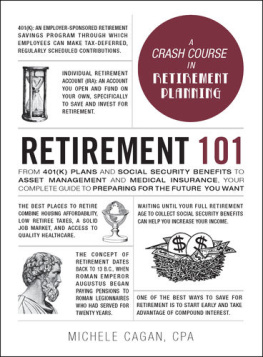
DEFICIT
WHY SHOULD I CARE?
Second Edition
_____________
Marie Bussing-Burks

Deficit: Why Should I Care? Second Edition
Copyright 2012 by Marie Bussing-Burks
All rights reserved. No part of this work may be reproduced or transmitted in any form or by any means, electronic or mechanical, including photocopying, recording, or by any information storage or retrieval system, without the prior written permission of the copyright owner and the publisher.
ISBN-13 (pbk): 978-1-4302-4839-2
ISBN-13 (electronic): 978-1-4302-4840-8
Trademarked names may appear in this book. Rather than use a trademark symbol with every occurrence of a trademarked name, we use the names only in an editorial fashion and to the benefit of the trademark owner, with no intention of infringement of the trademark.
President and Publisher: Paul Manning
Acquisitions Editor: Jeff Olson
Technical Reviewer: Todd Knoop
Editorial Board: Steve Anglin, Mark Beckner, Ewan Buckingham, Gary Cornell, Louise Corrigan, Morgan Ertel, Jonathan Gennick, Jonathan Hassell, Robert Hutchinson, Michelle Lowman, James Markham, Matthew Moodie, Jeff Olson, Jeffrey Pepper, Douglas Pundick, Ben Renow-Clarke, Dominic Shakeshaft, Gwenan Spearing, Matt Wade, Tom Welsh
Coordinating Editor: Rita Fernando
Copy Editor: Judy Ann Levine
Compositor: SPi Global
Indexer: SPi Global
Cover Designer: Anna Ishschenko
Distributed to the book trade worldwide by Springer-Verlag New York, Inc., 233 Spring Street, 6th Floor, New York, NY 10013. Phone 1-800-SPRINGER, fax 201-348-4505, e-mail orders-ny@springer-sbm.com , or visit www.springeronline.com .
For information on translations, please contact us by e-mail at info@apress.com , or visit www.apress.com .
Apress and friends of ED books may be purchased in bulk for academic, corporate, or promotional use. eBook versions and licenses are also available for most titles. For more information, reference our Special Bulk SaleseBook Licensing web page at www.apress.com/bulk-sales .
The information in this book is distributed on an as is basis, without warranty. Although every precaution has been taken in the preparation of this work, neither the author(s) nor Apress shall have any liability to any person or entity with respect to any loss or damage caused or alleged to be caused directly or indirectly by the information contained in this work.
To Phyllis and Bill
Contents
About the Author

Marie Bussing-Burks holds Master of Business Administration and Doctorate of Arts in Economics degrees. She is an Assistant Professor of Economics in the College of Business at the University of Southern Indiana.
Bussing-Burks is the author of six other books: 100 Years of the Federal Reserve: The Central Banking System in the United States, Starbucks: Corporations that Changed the World, Money for Minors: A Students Guide to Economics, Influential Economists, Profit from the Evening News: Using Leading Economic Indicators to Make Smart Money Decisions, and The Young Zillionaires Guide to Taxation and Government Spending. In addition, she has more than 30 magazine, newspaper, and journal articles to her credit.
About the Technical Reviewer

Todd Knoop is a Professor of Economics and Business at Cornell College and the author of two books: Recessions and Depressions: Understanding Business Cycles and Modern Financial Macroeconomics: Panics, Crashes, and Crises. He also has a forthcoming book on financial markets in emerging market economies and has published articles in the Canadian Journal of Economics, Economic Inquiry, and Southern Economic Journal. He holds a Doctorate from Purdue University.
Acknowledgments
Writing this book has been a great learning experience and a collaborative effort. It is with sincere appreciation that I acknowledge the efforts of those who assisted me in this endeavor.
A special thanks to Jeff Olson, Executive Editor/Business at Apress, for providing me with this enlightening opportunity to explore the deficit and the national debt. His knowledge and insight on business topics has been invaluable. My sincere gratitude to Rita Fernando, Coordinating Editor at Apress. Her guidance, expertise, and contributions assisted me greatly. I am grateful to Professor Todd Knoop for his helpful comments on review of the text. My thanks to Cathy Bowman for her excellent editorial assistance. Last, I owe a debt of gratitude to Harry Zeeve, the National Field Director of The Concord Coalition, and Representative Bill Frenzel, guest scholar at Brookings Institution, for their valued interview responses.
It has been a pleasure working with everyone who has assisted with the writing of this book. I appreciate the assistance in investigating the largest economic concern of the time: the rising deficits and $16 trillion plus national debt.
Introduction
The United States is experiencing a host of serious economic problems, including soaring unemployment, stagnant production, a crippled housing market, and ballooning government spending. Although each issue is important, it is the governments burgeoning spending, along with the weakening economy from an approaching fiscal cliff, that has really captured everyones attention. The hot economic topic discussed around the kitchen table, at dinner parties and business meetings, on nightly news programs, and in academic settings is the deficit and the national debt.
Most people agree that the government is a big spender and the mounting debt is troublesome. In fact, in a recent USA Today/Gallup poll, federal government debt and terrorism tied as the most serious issue of concern to Americans for the future well-being of the United States. Yet some people, including prominent economists, are not all that worried about the debt.
In the press, on the Internet, and in the media, the public is often misinformed regarding the specifics of the current deficit and debt issue. In fact, the terms deficit and debt are routinely and incorrectly used as interchangeable vocabulary. This book will set the record straight on the deficit and the debt, while presenting the facts in a clear, concise manner.
Here is a preview of what you will learn. The federal governments annual budget impacts the national debt. If the government were to post a balanced budget, it would mean the governments revenues equal expenses, or that taxation and fee collection are equal to spending. A balanced budget is an extremely rare occurrence. Routinely, budgets are either in a surplus or a deficit. When the government spends less than it collects in taxes, it runs a surplus. Each year for a 4-year period from 1998 to 2001, the United States had a surplus budget. Since then, the government has incurred a widening and alarming deficit.
The deficit is the yearly amount by which government spending exceeds taxation. The yearly deficit for 2012 is projected to surpass $1 trillion. The deficit stirs concern and debate because the government must borrow funds to pay for its excess spending. Too large to place on a giant credit card, the funds are borrowed by the federal government by issuing Treasury securities and savings bonds. The total amount of borrowing, known as the
Next page
